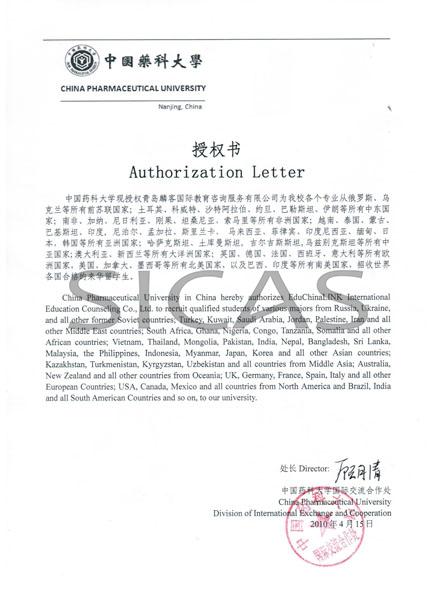School of Traditional Chinese Pharmacy
History
School of Traditional Chinese Pharmacy origins from the Faculty of Pharmacognosy of Nanjing College of Pharmacy. In 1986, Nanjing College of Traditional Chinese Pharmacy and Nanjing College of Pharmacy combined into one, and Nanjing College of Traditional Chinese Pharmacy is renamed as School of Traditional Chinese Pharmacy of CPU since then.
Fields of Research
Faculties mainly focus on 6 research areas: 1) Pharmacognosy; 2) Compound of Traditional Chinese Medicine; 3) Development of Traditional Chinese Medicine; 4) Heredity Breeding; 5) Biotechnology of TCM; and 6) Resources of Traditional Chinese Medicine. Natural Medicinal Chemistry and Pharmacognosy are two of the top disciplines in China.
The school has an exhibition hall of specimen of Traditional Chinese Medicine and a Medicinal Botanical Garden. The school also has a State Pharmaceutical Administration left, and Nanjing laboratory of Traditional Chinese Prescription and Quality Standard.
Program Overview
There are more than 1500 students in the School of Traditional Chinese Pharmacy, of whom 1000 are undergraduates, 500 are postgraduates pursuing master's and doctoral degrees. Starting from the 3rd year of study, undergraduates select from the three paths that best fit for their career development: 1) Pharmacy of Traditional Chinese Medicine (national first-class discipline); 2) Analysis of Traditional Chinese Medicine (second-class discipline); and 3) Biotechnology of Traditional Chinese Medicine.
Students in Natural Medicinal Chemistry, Pharmacology of Traditional Chinese Medicine and other related areas may choose to pursue a higher degree in Pharmacology, Traditional Chinese Pharmacy, or Pharmacognosy.
Featured Program
A master's program on the basis of the combination of Traditional Chinese Medicine and Western Medicine is designed to equip researchers with knowledge and skills required by the new century. Disciplines such as Natural Medicinal Chemistry, Pharmacognosy, Pharmacology of Traditional Chinese Medicine are open to postdoctoral researchers with various backgrounds, including international students.
Faculty
School of Traditional Chinese Pharmacy has over 90 faculty members, including 1 academician of the Chinese Academy of Sciences, 28 professors and research fellows, 30 associate professors and associate research fellows. 14 out of them are doctoral advisors and 30 are Master's .dvisors. Ye Juquan, the late famous Traditional Chinese Pharmacologist, Academician of Chinese cademy of Sciences, had been teaching in the school until the end of his life. Besides, 10 professors are members of National Committee of Examination and Appraisal of New Drugs. They participate in a series of national-level activities.
Prospect
Our faculties shoulder the great responsibility of renovating Traditional Chinese Pharmacy and are determined to overcome difficulties in the 21st century. The school is establishing relationships with pharmacy schools and enterprises home and abroad, and waiting for your participation.
--------------------------------------------------------------------------------
Departmentof Pharmacology of Chinese Materia Medica
The Department wasfounded in 1987, along with the School of Traditional Chinese Medicines (TCM). Ithas been headed by Prof. Bing-Qian Hang (1987-1992), Prof. Qiang Xu (1992-1998),Prof. Shi-Ping Ma (1998-2006) and Prof. Yue Dai (2006-present). At present, thereare ten academic members, among them are three full professors and twoassociate professors. Five faculty members hold Ph.D degrees, and have trainingexperience in foreign countries. Initially, the department only taught Pharmacologyof Chinese Materia Medica (PCMM) to undergraduate students but now teaches PCMM,Pharmacology, Physiology, Immunology and Immunopharmacology to postgraduate andundergraduate students. Research has been a major activity of the departmentsince its inception. Over the years, the research programmes have become moreand more diversified, covering modern aspects of different topics of PCMM. The currentresearch interests of the department include the following.
Immunopharmacology: pathophysiological mechanisms of immunological diseases (e.g., rheumatoid arthritis, diabetes, allergic dermatitis) and therapy by TCM; immunopharmacological activities and underlying mechanism of TCM and active components.
Neuropharmacology: therapeutics of neurodegenerative diseases such as Alzheimer’s disease by TCM; antidepressant activities and mechanism of Chinese prescriptions.
Cardiovascular Pharmacology: the functional role of transmembrane Ca channels and K channels in regulation of arterial tone; intracellular second messengers and therapeutic drugs; role of endothelium-derived mediators in the vascular response to vasodilators.
Pharmacokinetics:pharmacokinetics of bioactive components of TCM.
Drug Development: development of novel drugs from natural products.










